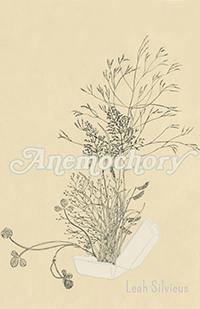ISSN: 1941-4137
POETRY THAT ENACTS THE ARTISTIC AND CREATIVE PURITY OF GLASS
POETRY THAT ENACTS THE ARTISTIC AND CREATIVE PURITY OF GLASS

Cody Stetzel received his MA in Creative Writing in poetry from the University of California at Davis. While from Rochester, New York, the former upstate & northeast hermit has replaced his slow-moving winter energies with the vitality of the west coast. His work has appeared in The East Coast Literary Review and Neovox: International.
January 31, 2018
Edited by Stephanie Kaylor
Edited by Stephanie Kaylor
She Always Had to Burn a Light: Review of Anemochory by Leah Silvieus
 Anemochory
by Leah Silvieus
Hyacinth Girl Press, 2016
Nocturnes and aubades are the two earliest forms I really began to play with. My visual-orientation first blossomed as a scene for poetry for me through an image of a maple near the top of a small hill, surrounded by small woods: this is where I'd think myself to write something I needed to outlet. It was always day, and I remember that when I first discovered nocturnes (through: Chopin and Frost) I desired to know the forms of other times, leading me to aubades.
When I think of aubades and nocturnes within poems, I have images in my head — I have places that I've been, and fantasies that I remember. It is rare for a form in poetry to have such a clear relationship with metaphora, in my opinion. Sestinas are particularly visually evocative for me, and of course there are many wonderful poets who make a strong, imagistic poem from a form; however, I mean that just from being made aware that a piece is a nocturne or aubade, I am transported.
So, of course, when I encounter a chapbook titled around dispersion and transportation with nocturnes and aubades, my heart tries even harder to grow its wings and carry the poem's seeds. But to say that the territory that Leah Silvieus' Anemochory transports me to is familiar would be an utter lie. When I read "Kansas City, KS," I have ideas in my head walking in — friends who are from Kansas having gave me a handful of ideas of what to expect from Kansas overall — and yet, this poem still takes me even further away:
… ash of the lost
valley o go & bury melt-and-thaw
o say comply comply bitters and rye
sazerac slow …
This moment in the poem is full: I want to say it aloud, I want to hum it through, I want to come-up with a three-step dance to someone singing it slowly with either a banjo accompaniment, or some ghastly synth-pop background aesthetic.
How can I do anything but fan, fawn, swoon (swan?) over the work in this collection though; openings such as: "we constructed grief in our images;" "We unearth places we once lived, the house / sundered by lichen;" "Here, tangerines like paper lanterns / wait for night to rob their glow." The poems don't seem to shy away from the difficulty of grieving, and the idea of what may come after an ending or a form of death. In fact, that moment seems to be what motivates these poems in their constructions and operations to begin with. Construction and operation feel like such distant actions for this chapbook.
I find that many of the poems in this collection are poems I needed, and that I hadn't known that I needed them prior to reading. Isn't desire so strange like this? The poems drew the landscape for their forestry, and allowed me to fill in the miniature plots. As written in "Nocturne with a Scene from an Erotic Film," "and it feels like immersion, / that guttural wring between lung and groin," the planting of this work encompasses me.
I used to hide from poetry so much that I'd write short stories just to tuck poems somewhere within the pages. And now imagine this: wishing for this collection to continue and be longer, so I might continue finding more places for poetry; however, that would be counter-intuitive to its title: a seed carries with it the hope of being short-lived, once it begins growing it becomes something else. Instead, I will return to the landscapes in my reveries, knowing the ecstatic world that Silvieus manages is one that I want to continue growing within.
Visit Leah Silvieus' Website
Visit Hyacinth Girl Press' Website
Anemochory
by Leah Silvieus
Hyacinth Girl Press, 2016
Nocturnes and aubades are the two earliest forms I really began to play with. My visual-orientation first blossomed as a scene for poetry for me through an image of a maple near the top of a small hill, surrounded by small woods: this is where I'd think myself to write something I needed to outlet. It was always day, and I remember that when I first discovered nocturnes (through: Chopin and Frost) I desired to know the forms of other times, leading me to aubades.
When I think of aubades and nocturnes within poems, I have images in my head — I have places that I've been, and fantasies that I remember. It is rare for a form in poetry to have such a clear relationship with metaphora, in my opinion. Sestinas are particularly visually evocative for me, and of course there are many wonderful poets who make a strong, imagistic poem from a form; however, I mean that just from being made aware that a piece is a nocturne or aubade, I am transported.
So, of course, when I encounter a chapbook titled around dispersion and transportation with nocturnes and aubades, my heart tries even harder to grow its wings and carry the poem's seeds. But to say that the territory that Leah Silvieus' Anemochory transports me to is familiar would be an utter lie. When I read "Kansas City, KS," I have ideas in my head walking in — friends who are from Kansas having gave me a handful of ideas of what to expect from Kansas overall — and yet, this poem still takes me even further away:
… ash of the lost
valley o go & bury melt-and-thaw
o say comply comply bitters and rye
sazerac slow …
This moment in the poem is full: I want to say it aloud, I want to hum it through, I want to come-up with a three-step dance to someone singing it slowly with either a banjo accompaniment, or some ghastly synth-pop background aesthetic.
How can I do anything but fan, fawn, swoon (swan?) over the work in this collection though; openings such as: "we constructed grief in our images;" "We unearth places we once lived, the house / sundered by lichen;" "Here, tangerines like paper lanterns / wait for night to rob their glow." The poems don't seem to shy away from the difficulty of grieving, and the idea of what may come after an ending or a form of death. In fact, that moment seems to be what motivates these poems in their constructions and operations to begin with. Construction and operation feel like such distant actions for this chapbook.
I find that many of the poems in this collection are poems I needed, and that I hadn't known that I needed them prior to reading. Isn't desire so strange like this? The poems drew the landscape for their forestry, and allowed me to fill in the miniature plots. As written in "Nocturne with a Scene from an Erotic Film," "and it feels like immersion, / that guttural wring between lung and groin," the planting of this work encompasses me.
I used to hide from poetry so much that I'd write short stories just to tuck poems somewhere within the pages. And now imagine this: wishing for this collection to continue and be longer, so I might continue finding more places for poetry; however, that would be counter-intuitive to its title: a seed carries with it the hope of being short-lived, once it begins growing it becomes something else. Instead, I will return to the landscapes in my reveries, knowing the ecstatic world that Silvieus manages is one that I want to continue growing within.
Visit Leah Silvieus' Website
Visit Hyacinth Girl Press' Website
Glass: A Journal of Poetry is published monthly by Glass Poetry Press.
All contents © the author.
All contents © the author.





